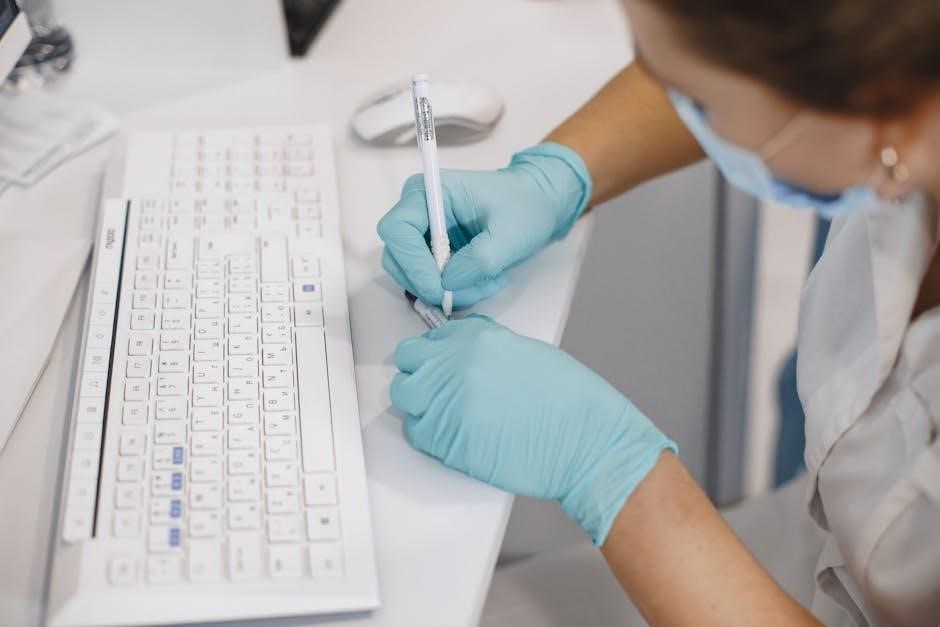Basic nursing notes are essential for nursing education, covering fundamental topics like anatomy, physiology, and patient care. They provide comprehensive guides for clinical skills and practices, ensuring effective learning and application in real-world scenarios. Accessing these notes in PDF format offers convenience and accessibility, making them a valuable resource for nursing students and professionals alike. Downloading and utilizing these resources can significantly enhance understanding and preparedness in delivering quality patient care.
Importance of Nursing Notes in Patient Care
Nursing notes are crucial for ensuring continuity and accuracy in patient care. They serve as a clear communication tool among healthcare providers, documenting a patient’s condition, treatments, and progress. Accurate and timely notes help in making informed decisions, preventing errors, and enhancing patient safety. They also provide a legal record of care delivered, protecting both patients and professionals. By maintaining detailed records, nurses can track changes in a patient’s condition and adjust care plans accordingly. Effective nursing notes foster collaboration, improve outcomes, and ensure that care is personalized and evidence-based, making them indispensable in modern healthcare settings.
Overview of Basic Nursing Concepts
Basic nursing concepts form the foundation of nursing education and practice. These concepts include understanding human anatomy, physiology, and the principles of patient care. Nurses learn about vital signs, infection control, and medication administration, which are critical for delivering safe and effective care. Additionally, psychological aspects, such as patient communication and emotional support, are emphasized to provide holistic care. These concepts are systematically covered in nursing notes, ensuring students grasp the essential skills and knowledge required for clinical practice. They serve as a roadmap for developing professional competencies, enabling nurses to address diverse patient needs with confidence and expertise.

Downloading and Utilizing Nursing Notes PDF
Accessing free PDF resources provides comprehensive study materials for nursing students. These notes cover essential topics, enabling effective learning and practical application in clinical settings and patient care.

Free Resources for Nursing Students
Accessing free nursing notes in PDF format is a valuable resource for students. Websites like NursesClass and others offer comprehensive study materials, covering subjects such as anatomy, physiology, and nutrition. These notes are carefully curated to provide essential information, helping students grasp key concepts efficiently. They are available for free download, making high-quality education accessible to all aspiring nurses. These resources are especially beneficial for exam preparation and clinical practice, ensuring students can focus on understanding core topics without the burden of costly materials. Utilizing these free resources empowers students to excel in their nursing education and future careers.
How to Effectively Use PDF Notes for Study
To maximize the benefits of PDF nursing notes, organize them into folders or digital files for easy access. Use highlighting and annotation tools to emphasize key concepts. Regularly review and summarize the content to reinforce learning. Utilize the search function to quickly locate specific topics. Combine PDF notes with other study materials like flashcards or practice questions for comprehensive preparation. Schedule regular study sessions to ensure consistent progress. Leveraging these strategies can enhance retention and application of knowledge, making PDF notes a powerful tool for academic success in nursing education.

Biological Sciences in Nursing
Biological sciences form the cornerstone of nursing education, encompassing anatomy, physiology, nutrition, and microbiology. These foundational subjects are crucial for understanding human health and effective patient care.
Anatomy: Key Structures and Systems
Anatomy is a fundamental subject in nursing, focusing on the study of human body structures and their functions. Key systems include skeletal, muscular, nervous, circulatory, respiratory, digestive, and urinary. Understanding anatomical terms and body organization is crucial for nurses to identify health issues and provide accurate care. Nursing notes often detail structures like the heart, lungs, liver, and kidneys, explaining their roles in maintaining homeostasis. These notes also cover cellular processes and tissue types, which are vital for diagnosing and treating conditions. By mastering anatomy, nurses can better assess patients, administer medications effectively, and perform procedures safely, ensuring optimal patient outcomes.

Physiology: Understanding Body Functions
Physiology focuses on how the body functions, emphasizing processes that maintain health and respond to stimuli. Key areas include nervous, circulatory, respiratory, and digestive systems. Nurses need to understand how these systems interact to regulate body functions, such as blood pressure, oxygen delivery, and nutrient absorption. Physiology notes explain concepts like homeostasis, metabolism, and hormonal regulation, which are crucial for assessing patient conditions and treating illnesses. By grasping these principles, nurses can identify deviations from normal function, administer appropriate care, and support the body’s natural healing processes, ensuring effective and personalized patient outcomes in clinical settings.
Nutritional and Biochemical Foundations
Nutrition and biochemistry form the cornerstone of patient care, influencing recovery and overall health. These notes emphasize the role of nutrients, metabolic pathways, and biochemical processes in bodily functions, providing nurses with essential knowledge to support dietary plans and understand disease mechanisms, aiding in holistic patient care.
Nutrition in Patient Care
Nutrition plays a vital role in patient care, impacting recovery, health outcomes, and overall well-being. Nursing notes emphasize the importance of assessing nutritional needs, managing dietary plans, and educating patients on healthy eating. Proper nutrition supports wound healing, strengthens immunity, and aids in disease management. Nurses must understand how nutrients like carbohydrates, proteins, and vitamins contribute to bodily functions. For instance, carbohydrates provide energy, while proteins support tissue repair. These notes also highlight the role of nurses in addressing malnutrition and ensuring patients receive balanced diets tailored to their conditions, promoting faster recovery and improved quality of life.
Biochemistry Basics for Nurses
Biochemistry is a cornerstone for nursing students, providing insights into metabolic pathways, enzyme functions, and biomolecule interactions. Understanding these concepts is crucial for grasping how diseases develop and how treatments work at a cellular level. Nursing notes highlight the role of biomolecules like carbohydrates, lipids, proteins, and vitamins in maintaining physiological balance. Key topics include enzyme kinetics, metabolic disorders, and the impact of nutrition on biochemical processes. This knowledge enables nurses to interpret lab results, manage medications, and provide personalized care. Biochemistry forms the foundation for understanding disease mechanisms and tailoring interventions, making it indispensable for effective clinical practice and patient outcomes.
Psychological and Microbiological Aspects
Understanding psychological principles aids in holistic patient care, while microbiology guides infection control practices. These aspects are vital for addressing mental health and preventing disease spread effectively.
Psychology in Nursing Practice
Psychology in nursing practice is crucial for understanding patient behaviors, emotions, and mental health. It equips nurses with skills to address psychological needs, ensuring holistic care. Key concepts include stress management, communication, and coping strategies. Nurses learn to assess mental health, identify disorders, and provide supportive interventions. Understanding psychological principles enhances patient-nurse relationships and improves care outcomes. These notes emphasize the importance of empathy and ethical decision-making in clinical settings. By integrating psychology into practice, nurses can better support patients’ overall well-being and recovery, making it a vital component of nursing education and professional development.
Microbiology and Infection Control
Microbiology and infection control are critical in nursing practice to prevent and manage infections. Nursing notes cover key concepts like pathogen identification, transmission modes, and antimicrobial therapies. Understanding microbial properties aids in interpreting lab results and developing effective care plans. Infection control measures, such as hand hygiene and sterilization, are emphasized to ensure patient safety. These notes also address isolation protocols and personal protective equipment usage. By mastering microbiology, nurses can implement evidence-based practices to reduce infection risks and promote healing. This knowledge is essential for maintaining a safe clinical environment and delivering high-quality patient care.
Nursing notes are invaluable for education and practice, enhancing understanding of key concepts and practical applications. They empower nurses to deliver effective, evidence-based patient care, ensuring success in the field.
Applying Knowledge in Clinical Settings
Applying knowledge from basic nursing notes in clinical settings is crucial for effective patient care. These notes provide foundational concepts, such as anatomy, physiology, and infection control, which guide nurses in assessing patients, planning care, and implementing interventions. By understanding these principles, nurses can identify normal vs. abnormal findings, prioritize tasks, and make informed decisions. Practical skills, like medication administration and wound care, are also reinforced through these resources. Ultimately, integrating this knowledge ensures safe, evidence-based practice, improving patient outcomes and promoting professionalism in nursing. Regular review of these notes enhances critical thinking and clinical reasoning, essential for real-world challenges.